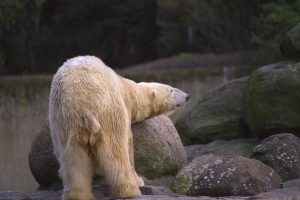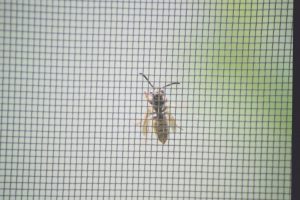 I have a lot of memories of visiting zoos as a younger person. There was the time my Boy Scout troop had an overnight stay at the Cincinnati Zoo, where we had behind-the-scenes tours of the habitats and infrastructure that made up the place; I was amazed at the intricate facades created for zoo visitors. Another summer at the same zoo and I'm about to start drinking my red cream soda during a field trip lunch break, when a bird poops directly into it from a tree overhead. I remember feeling frustration and resentment that this creature had invaded my personal space so - now I laugh at the irony of that resentment, felt so strongly against one who was just answering the call of this artificial shrine to come observe animal life, poop and all. And most recently, standing with my nose and right hand pressed up against the glass at the Lincoln Park Zoo in Chicago, apologizing to the once-grand and beautiful Gorillas on display there for the noisy people, the cheesy layout of the captivity, the life stolen from them. "I'm so sorry," I mouthed. "Please forgive us."
I have a lot of memories of visiting zoos as a younger person. There was the time my Boy Scout troop had an overnight stay at the Cincinnati Zoo, where we had behind-the-scenes tours of the habitats and infrastructure that made up the place; I was amazed at the intricate facades created for zoo visitors. Another summer at the same zoo and I'm about to start drinking my red cream soda during a field trip lunch break, when a bird poops directly into it from a tree overhead. I remember feeling frustration and resentment that this creature had invaded my personal space so - now I laugh at the irony of that resentment, felt so strongly against one who was just answering the call of this artificial shrine to come observe animal life, poop and all. And most recently, standing with my nose and right hand pressed up against the glass at the Lincoln Park Zoo in Chicago, apologizing to the once-grand and beautiful Gorillas on display there for the noisy people, the cheesy layout of the captivity, the life stolen from them. "I'm so sorry," I mouthed. "Please forgive us."
I've had plenty of conversations about why most zoos maybe aren't such a good thing, about what they symbolize, what they mean about who we are as a people and a culture. But until I read Thought to Exist in the Wild: Awakening from the Nightmare of Zoos by Derrick Jensen and with photography by Karen Tweedy-Holmes, I hadn't really explored that symbolism and sense of concern in any depth. And to that end, the book is a thought-provoking and eye-opening treatment of the subject.
Derrick Jensen, if you haven't already read his other work, writes and talks extensively on the destructive nature of modern culture. His works like A Language Older than Words, The Culture of Make Believe, and Endgame Volume 1 and Volume 2) are epic investigations into the many ways in which Jensen sees humans chipping away at the very foundations of life on Earth. Of primary concern to Jensen (from personal, ecological, moral perspectives alike) is the need to live in a world where non-human creatures are not sacrificed or imprisoned for the benefit of human creatures. It's no surprise, then, that he sees the institution of zoos and zoo-keeping as one of the most clearly harmful results of the human tendency to subjugate other life-forms for our own purposes, or out of a sense of god-like dominion and responsibility:
When we see it is not true that zoos rescue animals, that animals are better off in zoos than in the wild, than in their own homes; when we realize that zoos do not teach us about wild animals but that instead they teach us to misperceive animals entirely, that they reinforce the flattering and absurd (as well as lonely) perception that humans are separate from and superior to all other animals; when we know that zoos are prisons; when we see that zoos are big business amusement parks attempting to pass as anything but what they are; when we say out loud that by subduing, capturing, and imprisoning those who are wild (then saying it is for their and our benefit) zoos are tangible manifestations of the mindset and processes that are killing the planet...zookeepers and their supporters fall back one more time, to their final argument: through captive breeding programs, zoos are vital to the recovery of endangered species. --p.129-130
 As with his other books, Jensen seems to write out of a place of extreme anger and disgust, of urgency and necessity, and of hope for the future. His narrative is often quite personal, including stories of his direct experiences with zoos and animal captivity, and interspersing bits of insight about the spaces and times from which he is writing in with the essay itself. But he does not rest on intuitive conclusions, citing an extensive bibliography with almost as many endnotes as there are pages.
As with his other books, Jensen seems to write out of a place of extreme anger and disgust, of urgency and necessity, and of hope for the future. His narrative is often quite personal, including stories of his direct experiences with zoos and animal captivity, and interspersing bits of insight about the spaces and times from which he is writing in with the essay itself. But he does not rest on intuitive conclusions, citing an extensive bibliography with almost as many endnotes as there are pages.
He makes comparisons of zoos to pornography ("wanting to see animals when you want to see them, without being willing to work for their habitat and not get upset when they 'poop all over the place' is like wanting to have sex with someone without being willing to do what is necessary for the other person to want to spend that sort of time with you"), talks about the rationalizations that zoos are making use of funds that would not otherwise be available for wildlife conservation (quoting Mike Seidman, saying "Such is the depth of our love of nature -- that we will gladly donate vast sums to keep animals in elaborate cages but not to let them live wild."), and tries in earnest to answer the question of how we can let our children encounter wild animals without zoos. All of this creates a text that is at once emotionally engaging and academically broad.
And then there are the photos. Karen Tweedy-Holmes visited zoos around the country and captured not just the shots you might expect - an animal behind bars looking out at the "free" world - although there are plenty of those. She also shows plenty of animals without any visible sign of imprisonment around them, but who are clearly broken, with a demeanor that looks unnatural, eerie, out of place. She shows us animals on display for happy, pointing humans, surrounded by the "nightmares of concrete and steel, iron and glass, moats and electrified fences" that Jensen holds up over and over as an abomination.
I'm wondering if Thought to Exist in the Wild might be somewhat jarring for someone who hasn't read Jensen before. A lot of his lines of thought are based on premises explored in his other books, and while you don't necessarily need to know what they are or even agree with them to find meaning in this book, I think he assumes that you do have that context and his writing style reflects it.
I'm not writing this review of Jensen's book because it put me on a crusade to abolish animal captivity - at least for me, it often only crystallized or clarified thoughts and feelings I already had about the phenomenon of zoos. But it did that well, and I do think it is an interesting exploration of the subject -- certainly worthy of your time if you care to think about the relationships that humans have to other forms of life, and what zoos represent in those relationships.
 I’m a journalist, publisher, software developer and entrepreneur with experience as a founder and organizational leader. Work with me or learn more about me.
I’m a journalist, publisher, software developer and entrepreneur with experience as a founder and organizational leader. Work with me or learn more about me.
Great post. I'm reading this book right now. I talked to Derrick a few years ago, when he was first gathering information for this book, so I've been looking forward to reading it for a while. So far, like the rest of his books, as you know, it's fantastic.
This review is also being discussed on my DailyKos diary cross-post.
I´ve read the book and it´s amazing!! I recomend it to everybody